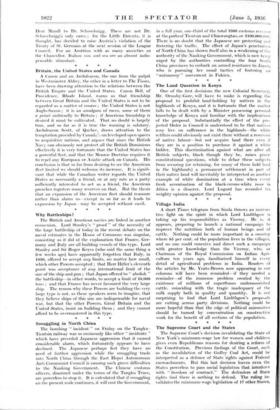Britain, the United States and Canada A Canon and an
Archdeacon, the one from the pulpit in Westminster Abbey, the other in a letter to The Times, have been drawing attention to the relations between the British Empire and the United States. Canon Bell, of Providence, Rhode Island, warns us that friendship between Great Britain and the United States is not to be regarded as a matter. of course ; the United States is not Anglo-Saxon ;. it is an amalgam of races, some of them a priori unfriendly to Britain ; if American friendship is desired it must be cultivated. That no doubt is largely true, and so far as it is true the warning is salutary. Archdeacon Scott, of Quebec, draws attention to the temptation provided by Canada% undeveloped open spaces to acquisitive nations, and argues that since the British Navy can obviously not protect all the British Dominions effectively it is very fortunate that the United States has a powerful fleet, and that the Monroe Doctrine requires it to repel any European or Asiatic attack on Canada. His conclusion is that so far from desiring to see the American fleet limited we should welcome its increase. It is signifi- cant that while the Canadian writer regards the United States as necessarily a friend, or at any rate as a party sufficiently interested to act as a friend, the American preacher registers many reserves on that. But the thesis that an expansion of the American fleet should reassure rather than alarm us—except in so far as it leads to expansion by Japan—may be accepted without cavil.














































 Previous page
Previous page